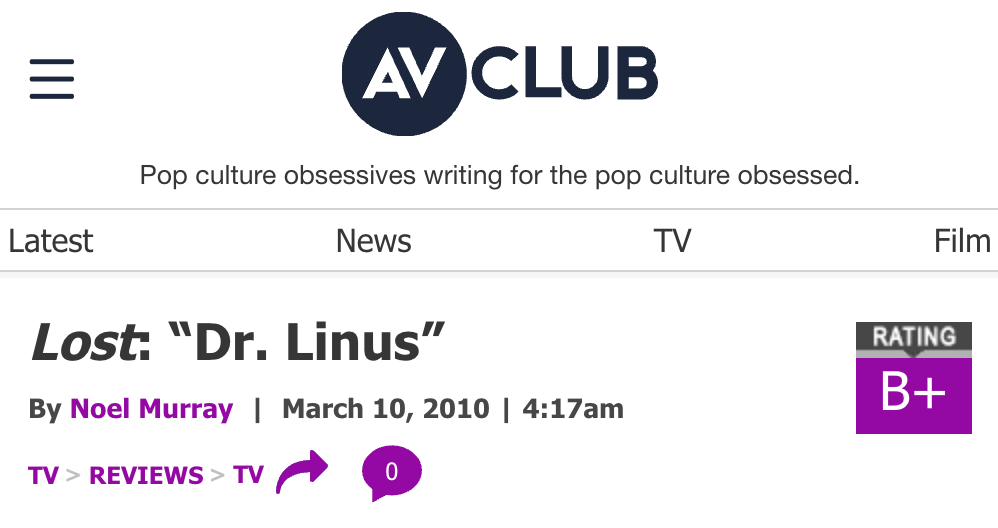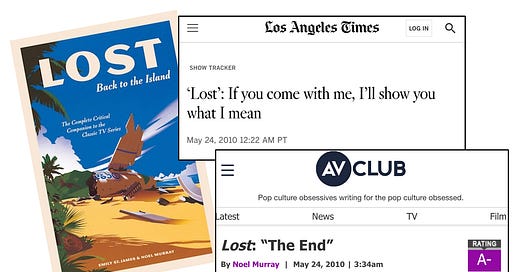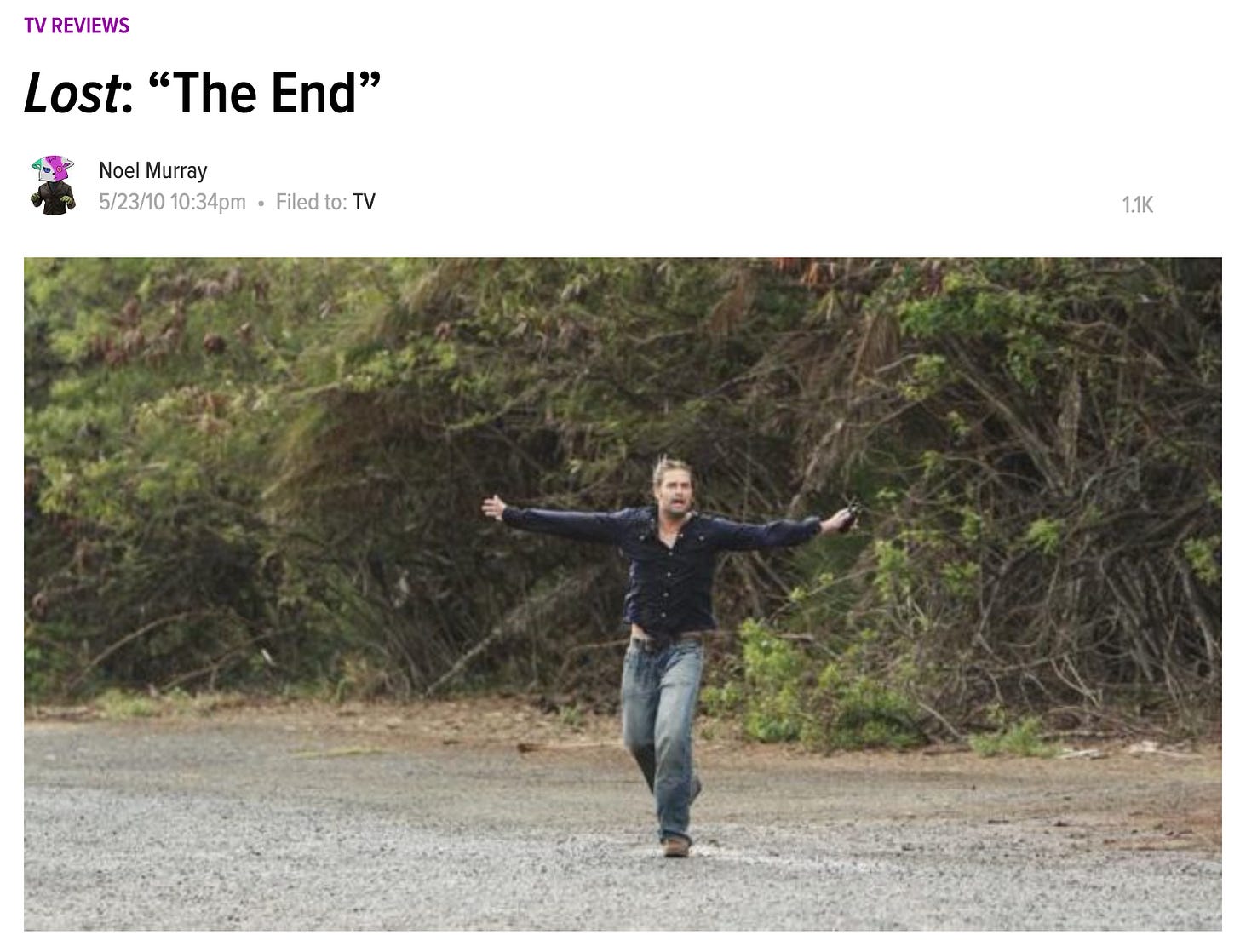Episodic Interview: Emily St. James & Noel Murray talk Lost's impact on TV criticism [Part One]
We all agree Lost changed TV, but how did it change the way we write about it?
Today is publication day for Episodic Medium contributor Noel Murray and friend of Episodic Medium Emily St. James, whose book Lost: Back to the Island is officially on store shelves and at your favorite online realtor. It’s a tremendous volume that covers every episode of the ABC series, making a strong case for its significance to both television and culture in the twenty years since its debut in 2004.
I was thrilled to have Noel join me to reflect on the fourth season of Lost for subscribers in our Episodic Classics coverage, and certainly I could have talked to Noel and Emily for hours about the nuances of the show and its storytelling in conversation with the great essays in their book. However, given that I’m the editor-in-chief of a newsletter dedicated to episodic criticism, one dimension of the show’s legacy that reflected on a lot while reading was how influential the show was on the work of TV critics.
I’m honored to be among those they cite in the book as part of the community of critics that emerged around the series, and our shared experience is something that I consider foundational to the work we do here at Episodic Medium (and my career as a critic). The release of the book felt like a great opportunity to pick their brains and reflect on how Lost changed our industry, and their own approach to writing criticism.
It was a lengthy conversation, so I’m dividing it into three parts that will be published over the course of the next week. It has been lightly edited for length and clarity because we talk too much.
Myles McNutt: I have brought us here today because I was reading through your wonderful book, which rightfully outlines the impact that Lost has had on pop culture and television. However, I was thinking a lot about the impact Lost had on TV criticism while I was reading, and so I put the question to each of you: how did writing about Lost shape your identity as a critic?
Emily St. James: I guess I'll start because I think I've said this in a few interviews now, but I've always felt like there are three separate movements of digital TV criticism. The first was Sopranos, which I'm a little too young for, and the third was Game of Thrones, which I'm a little too old for, and Lost is right in the middle. That's me—I'm baby bear. It was a time that felt very exciting—we were aware that online recapping existed, whether on Usenet or Television Without Pity, but Lost really felt like the first time that everybody needed someone to cover every episode of a show, and they started just paying anybody to do that. You know, if you had a sufficient reverence for Lost, you could just convince a website to let you write about it. I came very late to that, actually—I didn't professionally recap it until Season Five at The House Next Door, and I did season six at The L.A. Times. And while I had already started covering other shows on many platforms at that stage, Lost was the show that sparked my interest in criticism and also episodic recapping—it was the first show that really felt like every episode was a news event. Certainly, Sopranos had felt that way to an extent, but you didn't need somebody going like “and here's the intricate inner workings of the story, and here’s what’s up with Camus.” But with Lost you did have to have that person, and as a child of the internet that’s where I lived all the time.
Noel Murray: I had written a little bit about television for The A.V. Club prior to the TV club coming into existence. This is back when the site had “The Blog,” an experimental space where we could post just about anything we wanted to, which is wild to think about now—however, a lot of what became stuff that people think of when they think of sort of the golden age of The A.V. Club emerged from that blog. We did some TV criticism in that space, because we didn't have any other place for it, but I wasn’t writing about it as a “TV critic.” I was still writing about film primarily, and would cover television when there were DVD sets that came out—even when I did write about shows like Mad Men on the blog as they were airing, I was still kind of approaching it from the perspective of a film critic. I was thinking in terms of theme, character, plot, visuals, all of that kind of stuff, which you definitely could bring to Lost.
What was different, and what carried into Game of Thrones to Emily’s point, is all of the lore and deep mythology, or what I call “clues, coincidences, and crazy ass theories.” In my reviews, this is something that wasn’t—and still isn’t necessarily—my strong suit as a TV critic, but it’s something I know people want. It’s funny reading back some of those Lost reviews where I try to dive into the theorizing, and some of it is just completely bonkers. I don’t know what I was thinking, but it's there for perpetuity. Fortunately, for the book I was able to cut all that stuff out and stick to the part I could do better. But it was a moment where everybody wanted a deep dive on everything, and we knew there was going to be hundreds or thousands of comments where people picked up the baton from where we left off. Often the conversation didn’t even need us—sometimes at The A.V. Club we’d just put up a dummy post so we can get the comments started, because the comments were what mattered more than anything else.
ESJ: Noel, I vividly remember the image from the ABC Press Site that you chose for your recap of “The End,” because I went back to that comment section so many times. It’s just burned in my memory.
MM: If we’re talking about these distinct eras that you’ve outlined, Emily, what’s interesting about them for me is that you can see a clear shift. The Sopranos era was a very film critic approach to the prestige era of the late ‘90s and early ‘00s, but by the time you get to Game of Thrones it’s a much more lore-driven—to Noel’s point—environment that privileged a fan-focused, SEO-oriented critical perspective. Lost, then, is the perfect bridge between the two modes of analysis—it drew an enthusiast press community around it, but you also saw the existing critical establishing dip their toe in the water to figure out how they could write about it too. When I think about what we’ve been able to do with Episodic Medium in a subscriber-driven model, I still don’t think we’ll ever attain the sense of exploration that defined TV criticism at that time. There were no strict rules about how to write about a show like Lost, whereas now even in an environment free from page views and SEO there’s so much more expectation from editors and readers alike about what TV criticism is (or should be). I guess what I’m wondering is whether we’ve lost—pun intended—something since then in terms of how Lost changed TV criticism—have we strayed too far from the light in the cave? Was Lost the beginning of the end?
NM: I picked up Lost in the middle of the fourth season, and when I went back to those early reviews—as we talked about when going through season four at Episodic Medium, Myles—I realized they were all useless. There was nothing to them: it was just me having a conversation, like “hey guys, what do you think of this episode of Lost?” It had that “bloggy” feel, and while I was doing longer deep dives by the end of the show’s run (and I’m prouder of those), those early reviews were about a dialogue with readers. I don’t think those early reviews were very good, from my perspective as a critic, but some of that conversation element of the “Hey folks” mode was definitely lost in the intervening years.
ESJ: I think that for as much as we talk about Television Without Pity—Tara Ariano and Sarah D. Bunting—and Alan Sepinwall in terms of inventing online TV criticism, we need to also talk about Jeff Jensen. What he was doing at Entertainment Weekly writing about Lost was so huge and popular that it bent everything gravitationally toward it. This happens in criticism sometimes—look at the “Experts” and “Newbies” review structure that we invented at The A.V. Club. I did that one day with Game of Thrones when I was like “I’ve read the books, David Sims hasn’t, let’s do two reviews” and Keith Phipps was like “sounds fine!” And now it’s a standard of how people approach adaptations. Jeff’s Lost coverage had a huge impact on how people wrote about the show, with everyone iterating on his approach. But as wonderful as his articles were, when I went back and reread his last recap before the finale while working on the book, I realized I couldn’t understand any of it. There was so much conversation that was ongoing, and Jeff captured it so well, but it was captured in that moment.
I think about that a lot, because my writing about Community is still what a lot of people know me for, which I find very strange. But it was at a specific time and place in television, and a specific time and place in my life, and that conversation I was having with the fans of the show reflects that—I vividly remember watching season three of that show and enjoying it, but not feeling the joy I'd felt in it previously, but feeling like I had to perform that joy, because there were all these fans of the show that expected me to be a champion for a show that was embattled and always on the verge of cancellation. There was a need for Emily to be like the leader of this…thing, and I always felt ill-suited for that. And Lost was really the first show where the critics writing about it had to shape their perspective to make what the fans were interested in—the lore, the references, all that.
The show I write on now, Yellowjackets, had a real journey with this. I was active in that fan community before I wrote on it, and it was fascinating to watch them reverse engineer Lost discourse. So much of what TV criticism has been turned into has rested on adaptations like Game of Thrones, but Yellowjackets isn’t an extended universe, and early on in season one fans didn’t know what to do with all the clues and things to dissect. And so they just started doing what Lost discussion was early on—these are women in their young 20s who have no living memory of reading Lost recaps, but they invented it on their own. I try to remind myself that this is just always how these kinds of shows are going to be talked about—back then we were all trying to be Jeff Jensen and failing, but the conversational thing we created was so important and shows that his influence on television criticism goes beyond the deep dives into lore.
MM: I do think there were some consequences to that lore focus, though—Jeff’s model was great for Lost, but much as television as a whole struggled to capture Lost’s energy, not every show could withstand this level of scrutiny. I’d argue Yellowjackets is a great example of a show that aren’t really built for Lost discourse—last spring I wrote about how the expectation of a supernatural explanation would basically destroy the fabric of that show, but the discourse pushed viewers toward one anyway.
As Lindelof and Cuse’s experience shows, there’s some real pressure in creating TV if you know that you’re going to trigger the lore hunters—the parasocial relationship they built with audiences was untenable, and that’s no doubt true for creators of any show that follows in its footsteps. And that’s a pressure we face as critics as well when we were writing for those audiences. When you get to an episode like “Across the Sea,” you have to take a stand in that moment—did I like this? Was this good? How hard do I want to be on an episode of TV that you know is going to be divisive? It was a tension that I felt a lot during Game of Thrones’ final season, and it really goes back to embedding ourselves in the fan discussion of Lost and the stakes attached to each review.
NM: I remember feeling that a lot in the sixth season of Lost, which was just incredibly tricky for critics and fans alike. And that conversational thing I’m talking about became crucial—even though my reviews were a little more formed than they were in season four, I was still able to change my mind. I could write a review and then the following week come back and say “You know what, after reading your comments, I was too harsh on “Dr. Linus.” I think it’s more of an A- than a B+.” Remember distinguishing between an A- and a B+?

MM: Okay, but it was the worst between B- and C+. That difference was so significant in the eyes of the commentariat, and I would get to the end of a review and just sit there frozen: is it worth the hassle of a C+ comment section even if it’s right? And it just doesn’t matter. They never mattered. There was no actual consequence. So many B- reviews that should have been a C+, but I just couldn’t bring myself to do it.
NM: When I’d admit I was too harsh, people would come back and say “Well, are you gonna go back and change their change the grade now?” And of course not—the grades don’t matter.1 But “Across the Sea” was one of those episodes—I gave it a good review that week, and while I didn’t change my mind (and even went on some podcasts defending it), I still had to engage with the dialogue from the previous week. That ability to talk about things as they go along, and not have this thing I wrote stand for all time—that was really critical to the process.
ESJ: I feel like we've gotten more unnerved culture-wide by people who change their mind—if somebody shifts in any direction, well, they don't actually believe anything. But changing your mind about stuff is supposed to be part of being alive, becoming an adult, and understanding the world better. I would change my mind all the time on so many things that I wrote about. One of the reasons I think I was successful writing about television for the Internet was I tended to give everything the biggest benefit of the doubt that I could. I gave “Across the Sea” a very good review because I was like “they’re trying this thing and I’m very excited by it.” I was doing this because I was primarily thinking about television from the lens of someone who was trying to write for it—it wasn’t just that I was actively trying to get jobs and get people to like me (although it was probably subconsciously a lot of that), but rather that I was watching “Across the Sea” and thinking “I would do something like this. What a bold swing. What a brave thing they’re trying.”
Of course, there was an element of the fandom that was rightly like “I didn't think this worked. This was too big a swing for me. I just, I couldn't quite go there.” Some critics certainly felt similarly and wrote as such. However, I think the people who succeeded in episodic recaps tended to be more like me. Certainly, there were people that were harsh on things, who made that into a career—several worked at The A.V. Club. But the people who kept going up and up and up the ladder tended to be like, “I'm going to cut this as much slack as I possibly can, because I want to see where it's going.” Taking my career ambitions out of it entirely, it is worthwhile to do that when you’re kind of stuck with a show. You develop a kind of Stockholm syndrome where you get to the end of the season and maybe then you're like, “Oh, I didn't like this at all.” But along the way, you have so many hopes that it's going to pay off. I think that type of optimism is something we’ve lost as well—we’ve entered a space where there have been enough high profile shows with enormously disappointing finales that “goodwill” has gone out the window. Shows face a higher burden of proof in the wake of the Sopranos finale (even if I think it’s the best finale of all time) or the How I Met Your Mother finale or, of course, the Lost finale. It’s a much more film criticism approach to TV than what we were doing back during Lost, as though a lack of “payoff” is going to erase the pleasures of the show.
MM: I do sometimes wonder if the scrutinizing approach that we developed in the context of Lost has inured the modern audience to television tropes that used to be commonplace in a broadcast era. When I look at a show like Abbott Elementary, which is doing a very traditional “will they, won’t they” with Janine and Gregory, there was so much impatience around the story happening in online discourse. The vibe was “Oh come on, they can’t stretch this out forever,” but…it’s a broadcast sitcom. They could have absolutely stretched it out forever. But because the show is being made in an environment where the “lessons” from past eras of TV criticism are enshrined in thinkpieces, and where your average coverage of the show lacks the conversational dynamics we’re observing (Episodic Medium excluded, and not just because I insert my editorial feelings about the show into LaToya’s reviews), the show moved faster than it would have a decade ago, for better or worse. I guess this is where I wonder about whether Lost’s legacy in TV criticism is somewhat destructive, helping usher in a period where the modes of criticism are trying to flatten TV instead of adjusting to its contours.
Given that we’re specifically citing the value of dialogue in criticism, this felt like a productive place to stop and open the discussion up to our paid subscribers. If you want to join the conversation, our yearly pledge drive runs through the end of September with 20% off yearly subscriptions—if you simply want to make sure parts two and three come to your inbox, a free subscription is a signup away.
You can move onto Part Two be clicking below:
Myles here to note that I have to fact check Noel here in editorial: evidence suggests that he actually gave “Dr. Linus” a B originally, but raised the grade to a B+, as outlined in his review of “Recon” the following week. I think we can all say we’re shocked and disappointed at his lack of direct recall of 14 years ago. Tsk tsk.








![Episodic Interview: Noel Murray and Emily St. James talk Lost's impact on TV Criticism [Part Two]](https://substackcdn.com/image/fetch/w_140,h_140,c_fill,f_auto,q_auto:good,fl_progressive:steep,g_auto/https%3A%2F%2Fsubstack-post-media.s3.amazonaws.com%2Fpublic%2Fimages%2F555eb914-f44a-401c-bb6e-d4de6f61fbc4_1746x1020.png)
Just need to chime in to agree that there's nothing more stressful than deciding between a B- or C+
As I've probably said in just about a million comments here on Episodic Medium, LOST and perhaps more specifically LOST Criticism significantly shaped my life, my interests, my politics, and my career - is that too melodramatic, lol? I'm not a TV critic, but engaging with LOST fans online and following TV Critic Discourse about LOST (RIP TV Twitter) has so weirdly informed the things I care about. And I'm always here for reflections on reflections on reflections. Super excited to dig into the book (it arrived about an hour ago!) and looking forward to Parts 2/3 of this discussion!